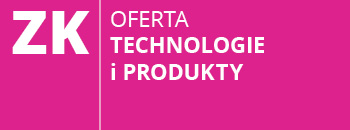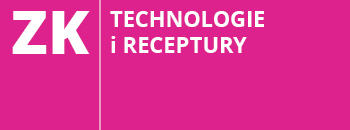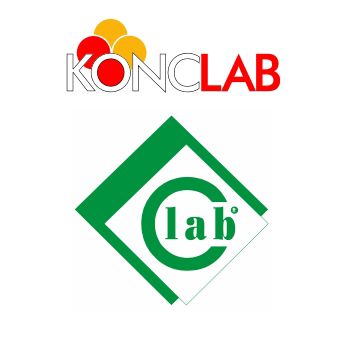
Head of Department
dr inż. Elżbieta Wojtowicz
tel. (+48) 618 731 972
kom. 603 508 093
e-mail: elzbieta.wojtowicz@ibprs.pl
Department Structure
PS – Pracownia Technologii Skrobi
GBS – Grupa Problemowa ds. Badań Sensorycznych
SD – Stacja Doświadczalna
SA – Sekcja Administracyjna
SJ – Stanowisko ds. Jakości
Contacts
| Nazwisko imię | Tytuł | Symbol Pracowni | Telefon | |
|---|---|---|---|---|
| Wojtowicz Elżbieta Kierownik Zakładu | dr inż. | PK, GBS | 618793472 618731972 603 508 093 | elzbieta.wojtowicz@ibprs.pl |
| Le Thanh-Blicharz Joanna kierownik PS | dr inż. | PS | 618 731 979 | joanna.lethanh-blicharz@ibprs.pl |
| Przygoński Krzysztof Kierownik PK | dr inż. | PK, GBS | 618 731 988 | krzysztof.przygonski@ibprs.pl |
| Bruch Mariola | PK, GBS | 61 8793-241 w.968, 989 | mariola.bruch@ibprs.pl | |
| Brzozowska Małgorzata | PK, GBS | 61 8793-241 w.969 | ||
| Buszka Marek | mgr inż. | PS | 618 731 973 | marek.buszka@ibprs.pl |
| Dziarska Bożena | PK, GBS | 61 8793 241 w.968, 989 | bożena.dziarska@ibprs.pl | |
| Jarosławski Leszek | dr inż. | PS | 618 731 975 | leszek.jaroslawski@ibprs.pl |
| Jóźwiak Irena | inż. | PK, SD GBS | 61 8793-241 w.996 | irena.jozwiak@ibprs.pl |
| Kulczak Małgorzata | dr inż. | PK, GBS | 618 731 986 | malgorzata.kulczak@ibprs.pl |
| Łuczak Hanna | mgr inż. | SJ, PK, GBS | 618 731 983 | hanna.luczak@ibprs.pl |
| Małyszek Zuzanna | mgr | PS | 618 731 976 | zuzanna.malyszek@ibprs.pl |
| Mańczak Ewa | SA | 61 8793-241 w.981 | ewa.manczak@ibprs.pl | |
| Roehr Ewa | SA | 61 8793-241 w.981 | ewa.roehr@ibprs.pl | |
| Stróżycka Hanna | mgr | PS, PK, SA | 618 731 977 | hanna.strozycka@ibprs.pl |
| Wysocka- Radke Jolanta | PS | 618731978 618731982 | ||
| Zielonka Roman | mgr inż. | PS | 618 731 974 | roman.zielonka@ibprs.pl |
| Hoppel Henryk Kierownik SD | SD | 61 8793-241 w.985 695 662 729 | henryk.hoppel@ibprs.pl | |
| Marcinkiewicz Robert | SD | 61 8793-241 w.997 | ||
| Klata Ireneusz | SD | 61 8793-241 w.997 |
Scope of activity
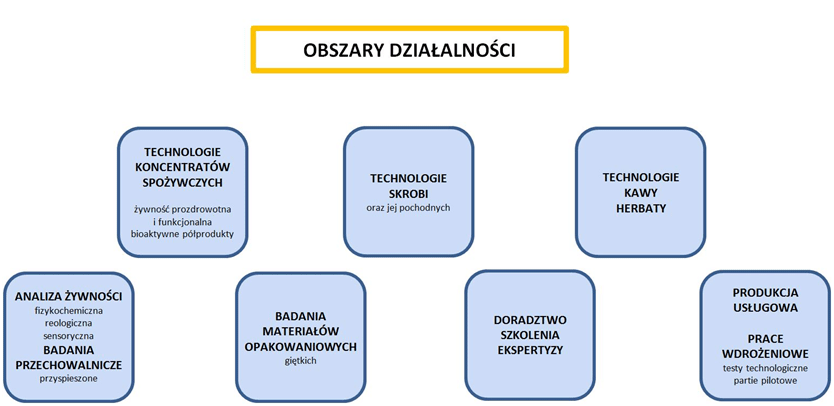
Recommendation
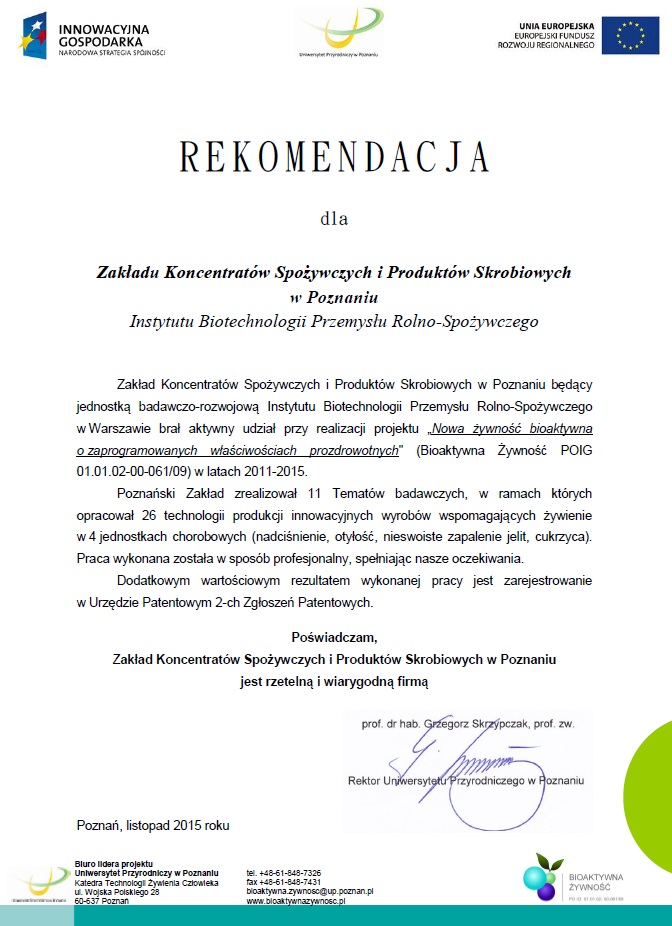
Accreditation
Accreditation – attestation by a third party regarding the conformity assessment body, for the purpose of formal demonstration of its competence to perform specific tasks in the field of conformity assessment.
PN-EN ISO/IEC 17000:2006
Accreditation should be understood as a formal recognition by the authorized accreditation body of competences of organizations operating in the area of conformity assessment, that is, certification bodies, inspection bodies or laboratories to perform specific activities.
The IBPRS Food concentrates and starch products department has competences confirmed by the Accreditation and Testing Laboratory Certificate AB 452 issued by PCA.
During the accreditation process in accordance with the requirements of PN-EN ISO / IEC 17025 in the IBPRS (ZK) Laboratory, the following have been assessed:
- technical competences;
- organization and management system guaranteeing impartiality and independence and ensuring the quality of research services provided.
Zakres Akredytacji Laboratorium Badawczego nr AB 452
Wydanie nr 18. Data wydania: 16 lipca 2018 r.
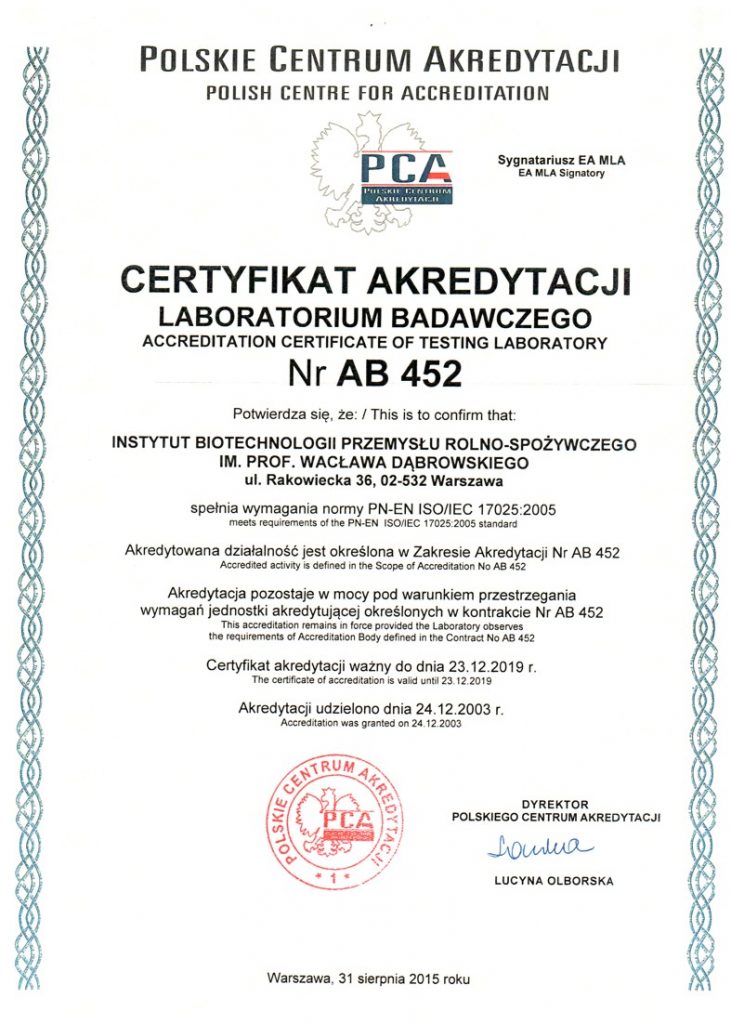
Competences
The Food concentrates and starch products department has competences confirmed by the Accreditation and Testing Laboratory Certificate AB 452 issued by the Polish Center for Accreditation.
Accreditation – attestation by a third party regarding the conformity assessment body, for the purpose of formal demonstration of its competence to perform specific tasks in the field of conformity assessment. (PN-EN ISO / IEC 17000: 2006)
Accreditation should be understood as a formal recognition by the authorized accreditation body of competences of organizations operating in the area of conformity assessment, that is, certification bodies, inspection bodies or laboratories to perform specific activities.
During the accreditation process in accordance with the requirements of PN-EN ISO / IEC 17025 in the IBPRS (ZK) Laboratory, the following have been assessed:
- technical competences;
- organization and management system guaranteeing impartiality and independence and ensuring the quality of research services provided.
Manager:
dr inż. Elżbieta Wojtowicz
tel. (+48) 61 873 19 89
(+48) 61 879 32 41
e-mail: elzbieta.wojtowicz@ibprs.pl
Sensory Research Problem Group:
Objective evaluation of the sensory quality of products is ensured by proper selection and training of the team, correct assessment conditions and research methods. The results of sensory tests can be used for quality control, development of new products, modification of existing products and selection of suppliers.
Sensory analysis basic methods:
- Simple descriptive method of food products before and after preparation – provides a full description of the products in terms of sensory characteristics (appearance, smell, consistency, taste) and allows to determine what elements or processes affect the product;
- Method of scaling (5-point) of food products after preparation – sensory attributes assessed separately (appearance, smell, consistency, taste) are included in one number, which expresses the overall quality of the product under evaluation;
Manager of the laboratory:
dr inż. Krzysztof Przygoński
tel. 61 8731 988
e-mail: krzysztof.przygonski@ibprs.pl
Food concentrates Laboratory (PK)
Scope of activity:
- Conducting scientific and research work on the content and changes during the technological process of health-promoting ingredients, harmful to health and volatile aromas.
- New sensory and nutritious concentrates technologies, including for older people and containing ingredients necessary for the proper functioning of the body, which can be easily and quickly prepared for breakfast, lunch or dessert dishes.
- Technologies and recipes for health-promoting products.
- Technologies of instant food concentrates using extrusion techniques: breakfast concentrates, concentrates: soups, 2nd dinner dishes and fillings for dishes. The research concerns the instantisation of raw materials (legume seeds, maize and other cereals) and the preparation of recipes for food concentrates with their participation.
- Natural coffee research, including the development of a method to reduce harmful substances (eg acrylamide, furfural, oxalates) and to improve the sensory quality of roasted coffee,
- Ways of utilizing by-products or waste generated in food processing for food purposes.
- Analytical methods development.
- Technological services for clients.
- Conducting storage research.
The laboratory is equipped with modern equipment and analytical equipment, including in:
- liquid chromatograph with detectors – with diode array (PDA), fluorescent, refractometric, electrochemical (CoulArray),
- gas chromatograph with FID detector,
- gas chromatograph with MS detector,
- climate chambers – for accelerated storage tests
Manager of the laboratory:
dr inż. Joanna Le Thanh-Blicharz
tel.: (+48) 61 873 19 76
e-mail: joanna.lethanh-blicharz@ibprs.pl
Starch Technology Laboratory (PS)
The laboratory is involved in developing new and modernizing existing starch processing technologies to produce:
- maltodextrins,
- dried starch syrups,
- standard starch syrups (obtained by the acid method),
- glucose syrups, maltose syrups, fructose syrups,
- crystalline glucose,
- other types of starch hydrolysates adapted to a specific application, such as: for ice cream and frozen desserts, for non-alcoholic and alcoholic beverages, for regenerative beverages, for fruit yogurts,
- food thickeners, thickeners and texturizers, including drinks, milk desserts, thermalized curd, reduced calorie margarines, food concentrates, mayonnaises, salad dressings and ketchups,
- functional food ingredients,
- starch preparations for the papermaking and textile industry,
- auxiliary agents for other industries.
The laboratory’s interests also include the processing of starch hydrolysates to obtain caramel, a natural dye used to color many food products.
The department has developed, among others the following recipes:
- mixtures for the production of potato crisps
- flavoring spices for fried potato snacks
- mixtures for obtaining cakes, noodles, potato dumplings and molded potatoes.
Implementation lines for continuous frying and packaging of potato snacks as well as a line for the production of dried products used to obtain fried potato snacks were implemented in the industrial practice.
As part of technology improvement, the following were developed and implemented:
- Device for the continuous, direct-contact heating of solutions, suspensions and pastes (maximum heating temperature – 160 ° C)
- A continuous steamer for evaporating starch of inferior quality and ground potatoes (for distillation)
- Thin-layer evaporator with slotted liquid raising.
The laboratory is also involved in the improvement of engineering of developed technologies, including the construction of atypical devices. Structures have been developed and used, among others:
- device for a continuous, quiescent solution heater, suspensions and pastes (maximum heating temperature 160 ° C)
- thin-film evaporator with slotted liquid raising.
Manager:
Henryk Hoppel
tel. (+48) 695 662 729
Experimental Station
It is equipped with devices and equipment enabling the implementation of many processes in the quarter and half-technical scale, including: grinding, mixing, extraction, compaction, drying (by different methods), extrusion. It also has prototype construction solutions.
At the Station, technological tests are carried out and samples of products are manufactured, including as part of customer services.


